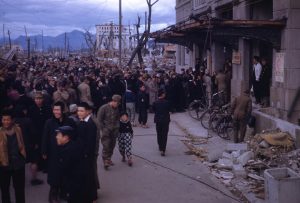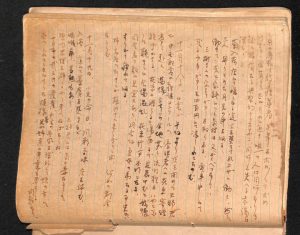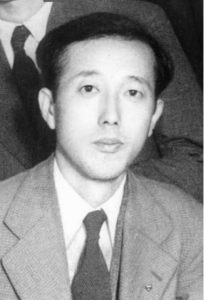Documenting Hiroshima of 1945: November 18, Sankichi Toge visits event venue with bouquet of flowers
Nov. 18, 2024
by Kyosuke Mizukawa, Senior Staff Writer
On Sunday, November 18, 1945, a singing contest for “newcomers” was held at the main office building of the Chugoku Haiden power company (present-day Chugoku Electric Power Co.), located in the area of Komachi (now part of Hiroshima’s Naka Ward). Barbershops and other local businesses in Hiroshima were involved in organizing the contest, and the event was advertised in the classified section of the November 14 Chugoku Shimbun newspaper as the “Long-awaited Popular Song Contest for Young People!”
Sankichi Toge, 28 at the time, wrote in his journal dated November 18 about how he had visited the venue. He had started the Midori Western Flower Shop with a friend in October and visited the contest venue to deliver a bouquet of flowers to the winner. However, the venue, full of spectators with popular songs being performed one after another, “became chaotic and ended up with my flowers being lost,” according to his journal.
In the same journal, Mr. Toge also recorded the days that had passed since August 6. He experienced the atomic bombing at his home in the area of Midori-machi (in Hiroshima’s present-day Minami Ward), around three kilometers from the hypocenter, and witnessed the “unforgettable” tragedy unfolding at the nearby Hiroshima Army Clothing Depot buildings, according to his journal entry dated August 8. “Half-naked, burn victims were laid out in various positions on blankets spread out on a spacious concrete floor. Half of them were already motionless corpses,” he also wrote on August 8.
Eventually, Mr. Toge himself fell ill and was admitted to a hospital in Mihara City. In September, he returned to Hiroshima City. He managed his roadside flower shop near the present-day Hiroshima Electric Railway’s Minami-machi 6-chome streetcar stop. He made a sign in English for the occupation forces, and American soldiers would also visit his shop.
In a journal entry dated August 15, Mr. Toge wrote about the change in his feelings from the “pitiful and regrettable” thoughts he had experienced immediately after the announcement of the end of the war. He wrote in a journal entry dated October 2, “Although my life is not easy at the moment, the war is over, so there is a ray of hope for the future even if it’s small.” On October 8, he wrote, “I am glad that the war is over,” and on November 17, “I feel so special when I hit the road home with my friends after work.”
Before the atomic bombing, while suffering from a bronchial illness, Mr. Toge had written poems and children’s stories. He wrote in his journal dated October 26, “On days when there are not so many customers, I let go of my anxious thoughts of not being able to sell flowers today, quietly looking up at the deepening autumnal sky, and think up ideas for children’s stories.” In 1951, Mr. Toge published a collection of A-bomb poems titled Genbaku no Shishu that included “Soko no Kiroku” (in English, ‘Records of the warehouse’), which described the horrors he witnessed at the Clothing Depot.
(Originally published on November 18, 2024)
On Sunday, November 18, 1945, a singing contest for “newcomers” was held at the main office building of the Chugoku Haiden power company (present-day Chugoku Electric Power Co.), located in the area of Komachi (now part of Hiroshima’s Naka Ward). Barbershops and other local businesses in Hiroshima were involved in organizing the contest, and the event was advertised in the classified section of the November 14 Chugoku Shimbun newspaper as the “Long-awaited Popular Song Contest for Young People!”
Sankichi Toge, 28 at the time, wrote in his journal dated November 18 about how he had visited the venue. He had started the Midori Western Flower Shop with a friend in October and visited the contest venue to deliver a bouquet of flowers to the winner. However, the venue, full of spectators with popular songs being performed one after another, “became chaotic and ended up with my flowers being lost,” according to his journal.
In the same journal, Mr. Toge also recorded the days that had passed since August 6. He experienced the atomic bombing at his home in the area of Midori-machi (in Hiroshima’s present-day Minami Ward), around three kilometers from the hypocenter, and witnessed the “unforgettable” tragedy unfolding at the nearby Hiroshima Army Clothing Depot buildings, according to his journal entry dated August 8. “Half-naked, burn victims were laid out in various positions on blankets spread out on a spacious concrete floor. Half of them were already motionless corpses,” he also wrote on August 8.
Eventually, Mr. Toge himself fell ill and was admitted to a hospital in Mihara City. In September, he returned to Hiroshima City. He managed his roadside flower shop near the present-day Hiroshima Electric Railway’s Minami-machi 6-chome streetcar stop. He made a sign in English for the occupation forces, and American soldiers would also visit his shop.
In a journal entry dated August 15, Mr. Toge wrote about the change in his feelings from the “pitiful and regrettable” thoughts he had experienced immediately after the announcement of the end of the war. He wrote in a journal entry dated October 2, “Although my life is not easy at the moment, the war is over, so there is a ray of hope for the future even if it’s small.” On October 8, he wrote, “I am glad that the war is over,” and on November 17, “I feel so special when I hit the road home with my friends after work.”
Before the atomic bombing, while suffering from a bronchial illness, Mr. Toge had written poems and children’s stories. He wrote in his journal dated October 26, “On days when there are not so many customers, I let go of my anxious thoughts of not being able to sell flowers today, quietly looking up at the deepening autumnal sky, and think up ideas for children’s stories.” In 1951, Mr. Toge published a collection of A-bomb poems titled Genbaku no Shishu that included “Soko no Kiroku” (in English, ‘Records of the warehouse’), which described the horrors he witnessed at the Clothing Depot.
(Originally published on November 18, 2024)










